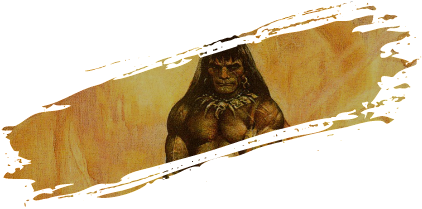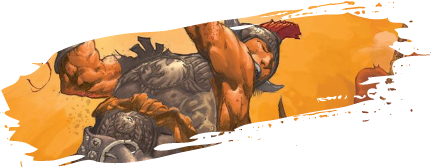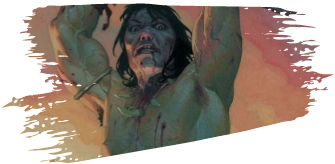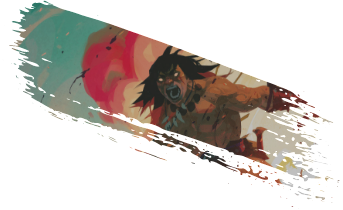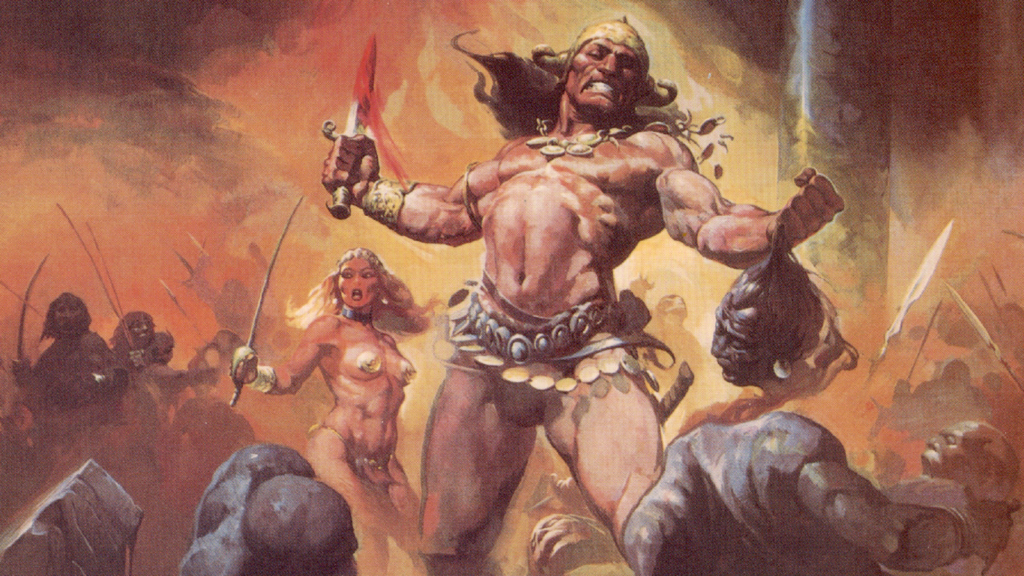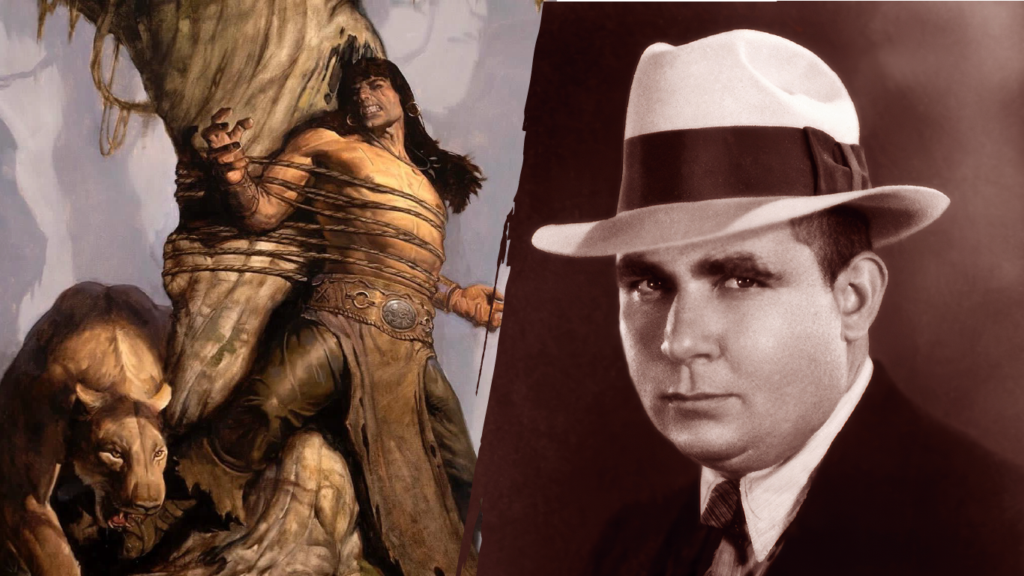
Hidden beneath the thrilling adventures and exotic locales of Conan the Barbarian’s tales lies a treasure trove of philosophical and existential insights waiting to be unearthed. Through the Cimmerian’s iconic quotes, author Robert E. Howard offers a glimpse into the mind of a true warrior-philosopher, revealing a complex and fascinating worldview shaped by the harsh realities of the Hyborian Age.
In this post, we will use six of Conan the Barbarian’s quotes to explore the profound themes and ideas that underpin his character and come to understand him as more than just a simple brute or mindless killing machine. Join us as we unravel the mysteries of Conan’s philosophy and discover what it truly means to walk in the footsteps of the Cimmerian, to embrace the primal essence of existence in a world that is as unforgiving as it is exhilarating.
Conan’s Quote About Barbarism vs Civilization

In the story “Beyond the Black River,” Conan speaks one of his most defining lines:
“Barbarism is the natural state of mankind. Civilization is unnatural. It is a whim of circumstance. And barbarism must always ultimately triumph.”
This stark pronouncement encapsulates the essence of Conan’s worldview and cuts to the heart of his enduring appeal as a character.
As a barbarian, Conan perceives civilization as a fragile veneer, a futile attempt to suppress mankind’s true, primal nature. This viewpoint is given powerful expression in the story, as Conan stands on the crumbling frontier of the Aquilonian empire, witnessing firsthand the inexorable advance of the barbaric Picts against the outposts of civilization.
Yet Conan’s words are more than commentary on the immediate geopolitical situation. They represent a profound statement about the cyclical nature of human history and the impermanence of civilized achievements. Conan recognizes that for all its grandeur and sophistication, civilization is ultimately a transitory phenomenon, doomed to eventual decline and collapse. Barbarism, in contrast, is the eternal and unchanging bedrock of human existence, the primordial state to which mankind is always fated to return.
Conan’s words, then, are not a celebration of barbarism for its own sake, but rather a recognition of its inescapable reality. He does not revel in cruelty or brutality, but neither does he shy away from acknowledging their existence as fundamental aspects of the human condition. His philosophy is one of clear-eyed realism, a willingness to confront the world as it is, rather than as we might wish it to be.
In this sense, Conan’s declaration that “barbarism is the natural state of mankind” stands as one of the most iconic and resonant statements in all of sword and sorcery literature. It captures the essence of the genre’s appeal, its ability to strip away the veneer of civilization and confront us with the unvarnished truth of our own nature. Through Conan’s eyes, we are forced to grapple with the fundamental questions of what it means to be human, and to ponder the precarious balance between the savage and the civilized that lies at the heart of our existence.
Conan’s Quote About The Importance of Tangibility

If Conan’s views on barbarism and civilization represent a lens through which he interprets the world, then his personal credo, expressed in “Queen of the Black Coast,” offers a glimpse into the beating heart of the man himself.
“I live, I love, I slay, and am content,”
he declares, a succinct encapsulation of his approach to life, a manifesto of pure, unadulterated existentialism.
“I seek not beyond death,”
he adds, a striking corollary that underscores the essential nature of his worldview.
For Conan, life is not a dress rehearsal, not a prelude to some greater reward in the hereafter. It is a fierce, exultant struggle, a brief, shining moment of vitality and passion amidst the vast, uncaring cosmos. He embraces the physicality of existence, the raw, visceral pleasures of the flesh and the thrill of combat, not as mere indulgences, but as expressions of his own indomitable spirit. In a world where death is the only certainty, Conan chooses to burn with life, to blaze with an intensity that sears itself into the fabric of reality.
Yet this is not to suggest that Conan is a simple hedonist, a brute who lives only for the next battle or the next wench. He is not justifying mindless self-gratification, but rather affirming the inherent value of life itself. Conan recognizes that meaning and purpose are not found in the promises of religion or the dictates of society, but in the crucible of one’s own experiences.
This revelation is thrown into sharp relief by Conan’s agnostic stance towards the gods and the afterlife. Throughout his wanderings, he encounters a pantheon of deities and demigods, each with their own claims to power and truth. Yet he remains unmoved by their entreaties, unswayed by their promises of eternal reward or punishment. For Conan, the only truth is that which he can grasp with his own hands.
In this sense, Conan’s credo stands as a powerful rejection of the civilized world’s obsession with the hereafter, its tendency to devalue the present in favor of some illusory future state. He recognizes, with the clarity of a man who has stared death in the face and laughed, that life is a fleeting gift, a precious spark to be cherished and nurtured in the here and now. To seek beyond death, to pin one’s hopes on the vagaries of faith or the whims of capricious gods, is to miss the point entirely, to squander the one thing that truly matters.
Conan’s Quote About the Hypocrisy of Civilization

In “The Tower of the Elephant,” Conan gives voice to his unfiltered perspective with his trademark blend of wit and savagery:
“Civilized men are more discourteous than savages because they know they can be impolite without having their skulls split.”
This seemingly humorous quip belies a cutting indictment of the hypocrisy and deceit that lies at the heart of civilized society.
For Conan, the veneer of civility is a flimsy facade, a mask worn by those who lack the courage and integrity to confront the world as it truly is. He sees through the false smiles and empty platitudes, the elaborate rituals and social conventions that serve only to obscure the darker realities of human nature. In a world where men and women lie and cheat and betray one another with impunity, Conan stands as a beacon of brutal honesty, a man whose word is his bond and whose actions speak louder than any hollow promises.
This unflinching adherence to a personal code of honor sets Conan apart from the civilized world and its myriad deceits. He does not engage in the petty intrigues and machinations of court politics, nor does he seek to advance himself through guile or manipulation. Instead, he confronts his challenges head-on, with the same fearless intensity that he brings to every aspect of his life. For Conan, there is no higher virtue than courage, no greater sin than cowardice or deceit.
Yet Conan’s disdain for civilized hypocrisy is not born of a simplistic moral absolutism, but rather an understanding of the fundamental duality of human nature. He recognizes that even the most refined and cultured individuals are capable of great cruelty and barbarism, that the trappings of civilization are but a thin veneer over the primal savagery that lurks within us all. In this sense, his code of honor is not a rigid set of rules, but a flexible and pragmatic approach to navigating the complexities of a harsh and unforgiving world.
Conan’s pragmatism is evident in the way he interacts with those around him, particularly those who seek to impose their own moral frameworks upon him. He is not beholden to any abstract ideals of justice or righteousness, but rather to his own innate sense of right and wrong. When faced with a choice between adhering to some arbitrary social convention or following his own instincts, Conan invariably chooses the latter, even if it means incurring the wrath or disapproval of those in power.
His fierce individualism abnd unwavering commitment to one’s own values and beliefs is perhaps the most enduring aspect of Conan’s character. In a genre that often celebrates the archetypes of the noble hero and the righteous warrior, Conan stands apart as a figure of unbridled authenticity. He is a man who lives life on his own terms, who refuses to be bound by the expectations or limitations of others, and who embraces the wild, untamed essence of his own being.
Conan’s Quote About Loyalty

In the opening scene of “Queen of the Black Coast,” Conan finds himself on the run from the authorities after refusing to betray his friend to a corrupt judge. As he recounts his tale to the ship captain who grants him passage, Conan explains:
“But I choked my ire and held my peace, and the judge squalled that I had shown contempt for the court, and that I should be hurled into a dungeon to rot until I betrayed my friend. So then, seeing they were all mad, I drew my sword and cleft the judge’s skull; then I cut my way out of the court, and seeing the high constable’s stallion tied near by, I rode for the wharfs, where I thought to find a ship bound for foreign parts.”
This brief account reveals the essence of Conan’s character and his uncompromising adherence to his own moral code. Faced with a choice between betraying his friend and submitting to the unjust demands of a corrupt system, Conan chooses the path of loyalty and defiance, even at great personal risk.
His actions demonstrate his utter contempt for the hypocrisy and injustice of the civilized world, and his willingness to stand up for his convictions no matter the cost. Conan’s declaration that he has “nothing to conceal” is a powerful assertion of his own integrity and autonomy.
In this sense, Conan’s defiance of the court is not just a single act of rebellion, but a broader rejection of the very foundations of civilized society. He recognizes that true justice and honor are not found in the trappings of the law, but in the hearts and actions of individuals who are willing to live according to their own unwavering moral principles.
Conan’s unflinching honesty and loyalty, even in the face of grave danger, stand in stark contrast to the duplicity and corruption of the civilized world. His refusal to compromise his values for the sake of expedience or self-preservation is a testament to the strength of his character and the depth of his convictions.
Conan’s Stolen Quote (from Kull)

In “By This Axe I Rule!”, Kull, the newly-crowned king of Valusia, faces a dire situation. A group of treacherous nobles, led by the wily Ascalante, have conspired to assassinate him in his bedchamber. Caught off guard and outnumbered, Kull finds himself in a desperate fight for survival.
As the assassins pour into the room, Kull, though wounded and bleeding, refuses to yield. Grabbing a battle-axe from the wall, he puts his back against the stone and prepares to make his final stand. It is at this moment, with the odds stacked overwhelmingly against him, that Kull hurls his defiant challenge at his would-be killers:
“Who dies first?”
This scene is a defining moment for Kull’s character, showcasing his indomitable will, his fierce courage, and his unyielding determination in the face of certain death. Outnumbered fourteen to one, with no helmet to protect his head and blood pouring from his wounds, Kull nevertheless stands firm, ready to fight to the bitter end.
His challenge to the assassins is not merely a taunt or a bluff, but a true reflection of his warrior spirit. Kull is prepared to die, but he will not do so meekly or quietly. If he is to fall, he will take as many of his enemies with him as he can, making them pay dearly for every drop of his blood spilled.
This scene also highlights the central conflict of the story—the struggle between Kull’s barbaric, straightforward nature and the treacherous, labyrinthine politics of the Valusian court. As a barbarian from Atlantis, Kull is an outsider in this world of courtly intrigue and hidden agendas. His direct, honest approach to rulership puts him at odds with the scheming nobles who seek to manipulate and control him.
In this sense, Kull’s stand against the assassins is not just a fight for his life, but a symbolic defense of his values and his way of life. By refusing to succumb to the machinations of his enemies, by meeting their treachery with unwavering courage and defiance, Kull asserts his right to rule on his own terms, guided by his own sense of honor and justice.
It is telling that, even in this moment of supreme peril, Kull’s thoughts are not solely on his own survival. When he recognizes some of the assassins, like Ridondo the minstrel, he calls out to them, urging them to turn back from this path of treachery. This demonstrates that, for all his barbaric fury, Kull is not a ruthless killer, but a man who values loyalty and friendship, even in his enemies.
In the end, of course, Kull’s indomitable spirit and fierce fighting skill carry the day. Though sorely wounded, he manages to hold off the assassins long enough for his loyal friend, Brule the Spear-slayer, to arrive with reinforcements. The treacherous nobles are defeated, and Kull’s right to rule is affirmed, not just by his royal birth, but by his unbreakable will and his commitment to justice.
This pivotal scene from “By This Axe I Rule!” would later be adapted by Howard into the first published Conan story, “The Phoenix on the Sword,” cementing its place in the canon of sword and sorcery literature. The image of the defiant barbarian king, standing alone against a horde of enemies, has become an iconic representation of the genre’s central themes—the power of the individual will, the triumph of courage over adversity, and the eternal struggle between civilization and barbarism.
Kull’s challenge to his attackers, “Who dies first?”, encapsulates these themes perfectly, conveying in three simple words the essence of the barbarian hero’s unyielding spirit and the depths of his resolve. It is a moment that has resonated with readers for generations, a testament to the enduring power of Howard’s storytelling and the timeless appeal of his unforgettable characters.
Conan’s Quote About the Innate Struggle of Life

As Conan and Bêlit navigate the jungles of Kush, they share a discourse that delves into the very heart of the Cimmerian’s worldview. It is during this intimate exchange that Conan gives voice to one of his most profound and revealing statements:
“In this world men struggle and suffer vainly, finding pleasure only in the bright madness of battle.”
This grim pronouncement serves as a potent encapsulation of Conan’s perspective on the human condition, shaped by a lifetime of wandering, conflict, and hardship. Born into the harsh and unforgiving world of Cimmeria, Conan has witnessed firsthand the cruelty and brutality that often define human existence. He has seen kingdoms rise and fall, witnessed the follies and betrayals of the powerful, and experienced the crushing weight of oppression and injustice.
Against this backdrop, Conan’s words take on a bleak and fatalistic tone. He acknowledges the fundamental truth that life is filled with struggle and suffering, that the vast majority of human endeavors are ultimately futile and vain. In a world where death and decay are the only constants, where even the mightiest empires are destined to crumble into dust, the pursuit of meaning and purpose can seem like a fool’s errand.
Yet Conan’s philosophy is not one of despair or nihilism. Rather, it is a clear-eyed recognition of the harsh realities of existence, tempered by a fierce determination to embrace life’s fleeting joys and moments of transcendence. For Conan, the “bright madness of battle” represents one of the few genuine pleasures available to men in a world of constant strife and upheaval.
In the heat of combat, Conan finds a sense of purpose and clarity, a heightened state of being that strips away the illusions and pretensions of civilized society. On the battlefield, he is alive in a way that he can never be in the stifling confines of the city or the palace. The rush of adrenaline, the clash of steel against steel, the primal surge of victory or the bitter sting of defeat—these are the moments that define Conan’s existence, that give meaning to his struggles and his triumphs.
Well, there you have it!
We’ve plumbed the depths of Conan’s psyche, grappled with his grim view of the world, and basked in the glory of his lust for life. It’s a philosophy that’s as raw and untamed as the man himself, a battle cry of defiance in the face of an uncaring universe.
So the next time you find yourself in a tavern, raising a flagon of ale to your lips, remember the words of the Cimmerian. Embrace the struggle, revel in the madness of battle, and never forget that in this world, it’s the barbarians who truly know how to live!

Lo Terry
In his effort to help Heroic Signatures tell legendary stories, Lo Terry does a lot. Sometimes, that means spearheading an innovative, AI-driven tavern adventure. In others it means writing words in the voice of a mischievous merchant for people to chuckle at. It's a fun time.


